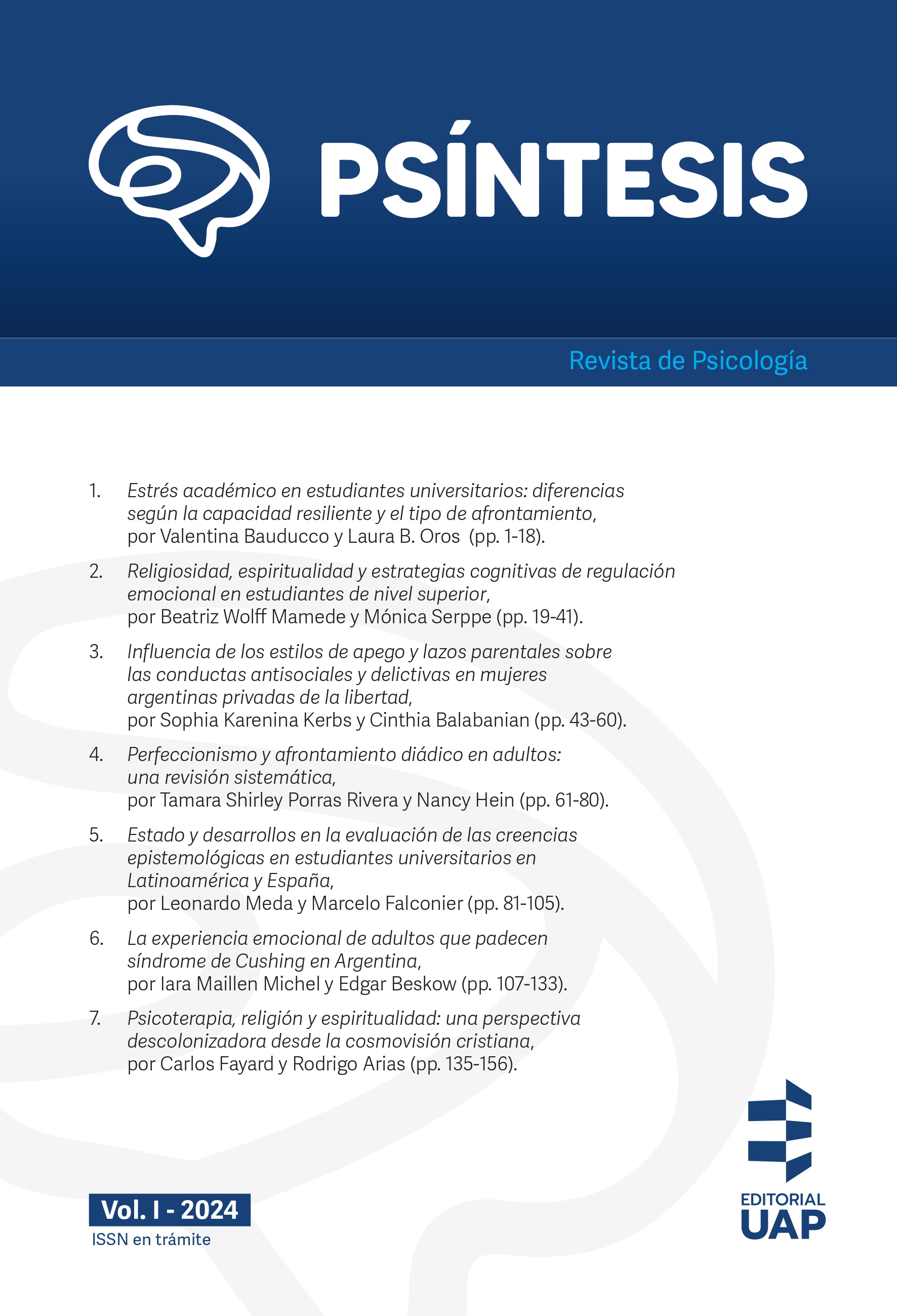Psicoterapia, religión y espiritualidad: una perspectiva descolonizadora desde la cosmovisión cristiana
DOI:
https://doi.org/10.56487/6cr1vw25Palabras clave:
Psicoterapia — Religión/espiritualidad — Descolonización — Cosmovisión cristianaResumen
El surgimiento de la corriente descolonizadora de la psicología, extendiéndose al ámbito académico y las teorías clínicas con las que se vincula, converge con el reconocimiento de la relevancia de la religión y la espiritualidad en el ámbito clínico. Esto ha producido un espacio para la legitimación de epistemologías y metodologías previamente silenciadas por no acomodarse a la cosmovisión tradicionalmente dominante en el campo de la psicología. Una de las metodologías destacables es la émica, la cual propone construir el conocimiento desde “adentro” de una comunidad, obteniendo así constructos que reflejan más significativamente la cosmovisión de los individuos que la integran. A partir de este nuevo marco, puede considerarse la cosmovisión cristiana fundamentada en la información bíblica (“revelación divina”) como opción epistemológica para el desarrollo de constructos que resulten en una antropología bíblica. Tal antropología podría servir de andamiaje para la selección e implementación de técnicas terapéuticas basadas en la evidencia, pero guiadas por el diseño del Creador para el florecimiento del ser humano ( Jn 10,10).
Descargas
Referencias
Allmon, A. L. (2013). Religion and the DSM: From pathology to possibilities. Journal of Religion & Health, 52(2), 538-549. https://doi.org/10.1007/s10943-011-9505-5
Bedi, R. P. (2018). Racial, ethnic, cultural, and national disparities in counseling and psychotherapy outcome are inevitable but eliminating global mental health disparities with indigenous healing is not. Archives of Scientific Psychology, 6(1), 96.https://doi.org/10.1037/arc0000049
Bouwhuis-Van Keulen, A., Koelen, J., Eurelings-Bontekoe, L., Hoekstra-Oomen, C. y Glas, G. (2024). The evaluation of religious and spirituality-based therapy compared to standard treatment in mental health care: A multi-level meta-analysis of randomized controlled trials. Psychotherapy Research, 34(3), 339-352. https://doi.org/10.1080/10503307.2023.2241626
Comas-Díaz, L., Adames, H. Y. y Chavez-Dueñas, N. Y. (Eds.). (2024). Decolonial psychology: Toward anticolonial theories, research, training, and practice. American Psychological Association. https://doi.org/10.1037/0000376-000
Comas-Díaz, L. y Jacobsen, F. M. (2024). Decolonial psychotherapy: Joining the circle, healing the wound. En L. Comas-Díaz, H. Y. Adames, y N. Y. Chavez-Dueñas (Eds.), Decolonial psychology: Toward anticolonial theories, research, training, and practice (pp. 295-320). American Psychological Association. https://doi.org/10.1037/0000376-013
Cortés, J. de. (1999). Antecedents to the conflict between psychology and religion in America. Journal of Psychology & Theology, 27(1), 20-32.
Cummings, N. y Cummings, J. (2009). Psychology and religion: A brief history of a paradoxical relationship. En N. Cummings, W. O’Donohue, y J. Cummings (Eds.), Psychology’s war on religion (pp. 1-15). Zeig, Tucker & Theisen.
DiFonzo, N. y Johnson, E. L. (2024). Discerning worldview assumptions in psychological texts: A primer for Christians in psychology. Journal of Psychology and Christianity, 43(2), 135-150.
Dueck, A. (2020). Indigenous psychologies of spirituality: Remembering, excavating, and individuating. En T. Sisemore, y J. Knabb (Eds.), The psychology of world religions and spiritualities (pp. 123-140). Templeton Press.
Duggal, C. y Sriram, S. (2022). Locating the sacred within the therapeutic landscape: Influence of therapists’ religious and spiritual beliefs on psychotherapeutic practice. Spirituality in Clinical Practice, 9(3), 186-198. https://doi.org/10.1037/scp0000271
Ellis, A. (1992). My current views on Rational-Emotive Therapy (RET) and religiousness. Journal of Rational-Emotive & Cognitive-Behavior Therapy, 10(1), 37-40. https://doi.org/10.1007/BF01245740
Ellison, C. y Flannelly, K. (2009). Religious involvement and risk of major depression in a prospective nationwide study of African American adults. The Journal of Nervous and Mental Disease, 197(8), 568-573. https://doi.org/10.1097/NMD.0b013e3181b08d96
Ellison, C. G., Musick, M. A. y Henderson, A. K. (2008). Balm in Gilead: Racism, religious involvement, and psychological distress among African-American adults. Journal for the Scientific Study of Religion, 47(2), 291-309. https://doi.org/10.1111/j.1468-5906.2008.00408.x
Ellison, C. G., DeAngelis, R. T. y Güven, M. (2017). Does religious involvement mitigate the effects of major discrimination on the mental health of African Americans? Findings from the Nashville stress and health study. Religions, 8(9), 195. https://doi.org/10.3390/rel8090195
Exline, J. J. (2013). Religious and spiritual struggles. En K. I. Pargament, J. Exline, y J. Jones (Eds.), APA handbook of psychology, religion, and spirituality (Vol. 1: Context, theory, and research) (pp. 459-476). American Psychological Association. https://doi.org/10.1037/14045-025
Fayard, C. (2023). Principios cristianos para la práctica del asesoramiento psicológico y la psicoterapia: un enfoque neuropsicoespiritual. Editorial Universidad Adventista del Plata.
Fayard, C. y Kim, W. (en prensa). On the front lines: The role of religion, spirituality and faith communities in addressing mental health disparities. En D. Dawes, N. Dunlap, y O. Martinez (Eds.), Health equity and the political determinants of health. Springer Publishing.
Freud, S. (2001). Totem and tabu. Routledge Classics. (1989). The future of an illusion. W.W. Norton & Company. (1933). New introductory lectures on psychoanalysis. Hogarth Press.
Gone, J. P. (2021). Decolonization as methodological innovation in counseling psychology: Method, power, and process in reclaiming American Indian therapeutic traditions. Journal of Counseling Psychology, 68(3), 259-270. https://doi.org/10.1037/cou0000500
Hayes, S. C. (2002). Buddhism and acceptance and commitment therapy. Cognitive and Behavioral Practice, 9(1), 58-66. https://doi.org/10.1016/S1077-7229(02)80041-4
Hays, S. (2017). EP09 Workshop 37 – Examining acceptance, mindfulness, values moment to moment in session. Evolution of Psychotherapy Conference.
Herrawi, F., Logan, J., Cheng, C.-P. y Cosgrove, L. (2022). Global health, human rights, and neoliberalism: The need for structural frameworks when addressing mental health disparities. Journal of Theoretical and Philosophical Psychology, 42(1), 52-60. https://doi.org/10.1037/teo0000192
Horion, J., Numbers, R. y Binzley, R. (2018). The warfare between science & religion: The idea that wouldn’t die. Johns Hopkins University Press.
Hughes, S. (2018). A brief introduction to philosophy of science as it applies to clinical psychology. En S. Hayes, y S. Hofmann (Eds.), Core competencies of behavioral and cognitive therapies. New Harbinger Publications.
Huguelet, P. (2020). Spirituality, religion, and psychotic disorders. En D. H. Rosmarin, y H. G. Koenig (Eds.), Handbook of spirituality, religion, and mental health (2.ª ed., pp. 79-97). Academic Press. https://doi.org/10.1016/B978-0-12-816766-3.00005-7
Jackson, J. y Coyle, A. (2009). The ethical challenge of working with spiritual difference: An interpretative phenomenological analysis of practitioners’ accounts. Counselling Psychology Review, 24(3-4), 86-99.
Knabb, J. J., DiFonzo, N. y Garzon, F. (2024). Emic Christian worldview psychologies: Theoretical and empirical contributions. Journal of Psychology and Christianity, 43(2), 108-121.
Knabb, J. y Donavan, T. (2024). The relationship between Christian worldview, wellbeing, and psychopathology: A mediation study. Journal of Psychology and Christianity, 43, 122-134.
Knabb, J. J., Wang, K. T., Hall, M. E. L. y Vazquez, V. E. (2022). The Christian Worldview Scale: An emic measure for assessing a comprehensive view of life within the Christian tradition. Spirituality in Clinical Practice. Publicación anticipada en línea. https://doi.org/10.1037/scp0000306
Knabb, J. J., Vazquez, V. E., Wang, K. T. y Pate, R. A. (2023). The Christian Gratitude Scale: An emic approach to measuring thankfulness in every season of life. Spirituality in Clinical Practice, 10(4), 304-315. https://doi.org/10.1037/scp0000278
Knabb, J. J., Vazquez, V. E., Pate, R. A., Lowell, J. R., Wang, K. T., De Leeuw, T. G., Dominguez, A. F., Duvall, K. S., Esperante, J., Gonzalez, Y. A., Nagel, G. L., Novasel, C. D., Pelaez, A. M., Strickland, S. y Park, J. C. (2022). Lectio divina for trauma symptoms: A two-part study. Spirituality in Clinical Practice, 9(4), 232-252. https://doi.org/10.1037/scp0000303
Koenig, H., Pearce, M., Nelson, B., Shaw, S., Robins, C., Daher, N., Cohen, H., Berk, L., Bellinger, D., Pargament, K., Rosmarin, D., Vasegh, S., Kristeller, J., Juthani, N., Nies, D. y King, M. (2015). Religious vs. conventional cognitive behavioral therapy for major depression in persons with chronic medical illness: A pilot randomized trial. The Journal of Nervous and Mental Disease, 203(4), 243-251. https://doi.org/10.1097/NMD.0000000000000273
Koenig, H., VanderWeele, T. y Peteet, J. (Eds.). (2023). Handbook of religion and health. Oxford University Press.
Larson, D. B., Thielman, S. B., Greenwold, M. A., Lyons, J. S., Post, S. G., Sherrill, K. A., Wood, G. G. y Larson, S. S. (1993). Religious content in the DSM-III—R Glossary of Technical Terms. The American Journal of Psychiatry, 150(12), 1884-1885. https://doi.org/10.1176/ajp.150.12.1884
Lopez, D., Saenz Escalante, G. y Weisman de Mamani, A. (2023). The role of religious coping on suicidality among Latinx and Black/African American individuals with schizophrenia spectrum disorders. Spirituality in Clinical Practice, 10(3),219-232. https://doi.org/10.1037/scp0000317
Lucchetti, G., Koenig, H. G. y Lucchetti, A. L. G. (2021). Spirituality, religiousness, and mental health: A review of the current scientific evidence. World Journal of Clinical Cases, 9(26), 7620-7631. https://doi.org/10.12998/wjcc.v9.i26.7620
Mariotti, M., Saba, G. y Stratton, P. (2022). Towards a truly systemic account of the current and future of manualisation. En M. Mariotti, G. Saba, y P. Stratton (Eds.), Handbook of systemic approaches to psychotherapy manuals (pp. 1-20). Springer.https://doi.org/10.1007/978-3-030-73640-8_1
Mostowlansky, T. y Rota, A. (2020). Emic and etic. Cambridge encyclopedia of anthropology. https://doi.org/10.29164/20emicetic
Mowrer, A. (2000). Philosophy of science and the foundations of psychotherapy. American Psychologist, 55(10), 1117-1125. https://doi.org/10.1037//0003-066X.55.10.1117
Nicholi, A. (2002). The question of God: C.S. Lewis and Sigmund Freud debate God, love, sex, and the meaning of life. Free Press.
Pargament, K. y Exline, J. (2022). Working with spiritual struggles in psychotherapy: From research to practice. The Guilford Press.
Pargament, K. I., Mahoney, A., Exline, J. J., Jones, J. W. y Shafranske, E. P. (2013). Envisioning an integrative paradigm for the psychology of religion and spirituality. En K. I. Pargament, J. J. Exline, y J. W. Jones (Eds.), APA handbook of psychology, religion, and spirituality (Vol. 1: Context, theory, and research) (pp. 3-19). American Psychological Association. https://doi.org/10.1037/14045-001
Post, S. G. (1992). DSM-III-R and religion. Social Science & Medicine, 35(1), 81-90. https://doi.org/10.1016/0277-9536(92)90121-6
Propst, L. R., Ostrom, R., Watkins, P., Dean, T. y Mashburn, D. (1992). Comparative efficacy of religious and nonreligious cognitive-behavioral therapy for the treatment of clinical depression in religious individuals. Journal of Consulting and Clinical Psychology, 60(1), 94-103. https://doi.org/10.1037/0022-006X.60.1.94
Richards, P. y Bergin, A. (2005). Spiritual strategy for counseling and psychotherapy (2.ª ed.). American Psychological Association Press.
Rogers, C. (1961). On becoming a person. Houghton Mifflin Company.
Rogers, L. O., Moffitt, U., McLean, K. C. y Syed, M. (2024). Research as resistance: Naming and dismantling the master narrative of “good” science. American Psychologist, 79(4), 484-496. https://doi.org/10.1037/amp0001246
Rosmarin, D., Bigda-Peyton, J., Kertz, S., Smith, N., Rauch, S. y Bjorgvinsson, T. (2013). A test of faith in God and treatment: The relationship of belief in God to psychiatric treatment outcomes. Journal of Affective Disorders, 146, 441-446. https://doi.org/10.1016/j.jad.2012.08.030
Rosmarin, D. H. y Koenig, H. G. (Eds.). (2020). Handbook of spirituality, religion, and mental health (2.ª ed.). Elsevier Academic Press.
Sandage, S. J. y Strawn, B. D. (Eds.). (2022). Introduction: Spiritual diversity in psychotherapy. En S. J. Sandage, y B. D. Strawn (Eds.), Spiritual diversity in psychotherapy: Engaging the sacred in clinical practice (pp. 3-15). American Psychological Association. https://doi.org/10.1037/0000276-001
Settles, I. H., Jones, M. K., Buchanan, N. T. y Dotson, K. (2021). Epistemic exclusion: Scholar(ly) devaluation that marginalizes faculty of color. Journal of Diversity in Higher Education, 14(4), 493-507. https://doi.org/10.1037/dhe0000174
Shedler, J. (2018). Where is the evidence for “evidence-based” therapy? Psychiatric Clinics of North America, 41(2), 319-329. https://doi.org/10.1016/j.psc.2018.02.001
Slife, B., Martin, G. y Sasser, S. (2017). A prominent worldview of professional psychology. En B. Slife, K. O’Grady, y R. Kosits (Eds.), The hidden worldviews of psychology’s theory, research, and practice (pp. 1-15). Routledge. https://doi.org/10.4324/9781315283975
Stetsenko, A. (28 de febrero de 2020). Transformative-activist and social justice approaches to the history of psychology. Oxford research encyclopedia of psychology. https:// oxfordre.com/psychology/view/10.1093/acrefore/9780190236557.001.0001/acrefore-9780190236557-e-466
Sue, D. W., Neville, H. A. y Smith, L. (2024). Racism in counseling and psychotherapy: Illuminate and disarm. American Psychologist, 79(4), 593-605. https://doi.org/10.1037/amp0001231
Tan, S.-Y. (1996). Religion in clinical practice: Implicit and explicit integration. En E. P. Shafranske (Ed.), Religion and the clinical practice of psychology (pp. 365-387). American Psychological Association. https://doi.org/10.1037/10199-013
Taylor, G. B., Vasquez, T. S. y Kastrinos, A. (2022). The adverse effects of meditationinterventions and mind-body practices: A systematic review. Mindfulness, 13,1839-1856. https://doi.org/10.1007/s12671-022-01915-6
Tjeltveit, A. C. (2016). Value conversion and moral (and spiritual?) transformations: Addressing some complexities of the ethical dimensions of psychotherapy. Journal of Psychology and Christianity, 35(4), 330-343.
Uher, J. (2021). Psychology’s status as a science: Peculiarities and intrinsic challenges; Moving beyond its current deadlock towards conceptual integration. Integrative Psychology & Behavioral Science, 55, 212-224. https://doi.org/10.1007/s12124-020-09545-0
Upenieks, L., Louie, P. y Hill, T. D. (2023). Welcome to the dark side: The role of religious/spiritual struggles in the Black-White mental health paradox. Society and Mental Health, 13(2), 151-168. https://doi.org/10.1177/21568693221119786
Vieten, C., y Lukoff, D. (2022). Spiritual and religious competencies in psychology. American Psychologist, 77(1), 26-38. https://doi.org/10.1037/amp0000821
Wainberg, M. L., Scorza, P., Shultz, J. M., Helman, L., Mootz, J., Johnson, K., Bradford, J-M., Oquendo, M. y Arbuckle, M. (2017). Challenges and opportunities in global mental health: A research-to-practice perspective. Current Psychiatry Reports, 19(28). https://doi.org/10.1007/s11920-017-0780-z
Yamada, A.-M., Lukoff, D., Lim, C. S. F. y Mancuso, L. L. (2020). Integrating spirituality and mental health: Perspectives of adults receiving public mental health services in California. Psychology of Religion and Spirituality, 12(3), 276-287. https:// doi.org/10.1037/rel0000260
Zhang, D., Lee, E., Mak, E., Ho, C. y Wong, S. (2021). Mindfulness-based interventions: An overall review. British Medical Bulletin, 138(1), 41-57. https://doi.org/10.1093/bmb/ldab005
Descargas
Publicado
Número
Sección
Licencia
Derechos de autor 2024 Psíntesis

Esta obra está bajo una licencia internacional Creative Commons Atribución-NoComercial-CompartirIgual 4.0.





